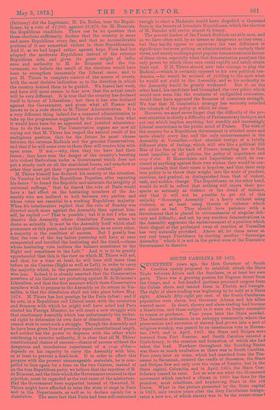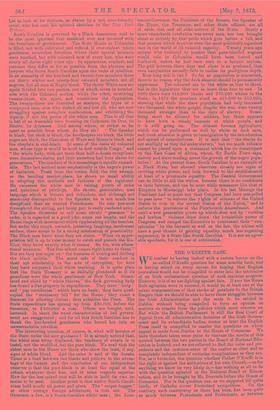SOUTH CAROLINA IN 1873.
SEVENTEEN years ago, the then Governor of South Carolina openly proposed to establish afresh the Slave Trade between Africa and the Southern, or at least her own ports. There was a growing passion for Negroes direct from the Congo, and a hot-headed partisan procured cargoes from the Cuban shore and landed them in Florida and Georgia. The right of slave-trading was beginning to be held as a State right. Already fifty-eight per cent. of the South-Carolinian population were slaves, but Governor Adams and his allies wanted more. In short, slavery and slave-trading had become a fanaticism, and those subject to it were no longer amenable to reason or prudence. Four years later the State seceded. The Secession ordinance, in an unhappy community where the preservation and extension of slavery had grown into a sort of religious worship, was passed by an unanimous vote in Novem- ber, 1860, and in April, 1861, the Stars and Stripes were lowered from Fort Sumter, and South Carolina entered a Confederacy, in the creation and formation of which she had taken the lead. Nowhere throughout the Seceding States was there so much exultation as there was in South Carolina. Four years later an army, which had marched from the Ten- nessee to Savannah, entered the cradle of Secession, the Stars and Stripes flew not only over the ruins of Sumter, but in the State capital, Columbia, and in April, 1865, the Slave Con- federacy ceased to exist. Let us now see what the ill-omened movement which reached a climax in 1860 has done for the proudest, most rebellious, and headstrong State in the old Union. What is the picture presented by the State capital in 1873, only twelve years after the fiery Carolinians inaugu- rated a new era, of which slavery was to be the corner-stone /
Let us look at its features, as drawn by a not over-friendly artist, who has seat his spirited sketches to the New York Tribune.
South Carolina is governed by a Black democracy, said to be the most ignorant that mankind ever saw invested with the functions of government. The State House at Columbia is filled, not with cultivated and refined, if over-violent white gentlemen, somewhat ferocious where their special interests were touched, but with coloured men of every hue, who were nearly all slaves eight years ago. In appearance, conduct, and costume they differ as far as possible from the planters and lawyers who drove South Carolina upon the rocks of rebellion. In an assembly of one hundred and twenty-four members there are thirty whites and ninety-four coloured members, not all negroes, but all men of Negro blood. The thirty White men are again divided into two parties, one of which, seven in number, note with the Coloured section, while the other, mustering twenty-three, sits apart, and constitutes the Opposition. The twenty-three are described as martyrs, the types of a conquered race, men who staked all and lost all, who are now struggling against complete confiscation, and exhibiting the dignity, if not the power of the white man. This is all that is left of an Assembly once boasting its Calhouns, its Orrs, its Rhetts, its Adamses. And among whom, or rather as far apart as possible from whom, do they sib? "The Speaker is black, the clerk is black, the doorkeepers are black, the little pages are black, the Chairman of Ways and Means is black, and the chaplain is coal-black. At some of the desks sit coloured men, whose type it would be hard to find outside Congo," and "the whole body, with not more than half-a-dozen exceptions, were themselves slaves, and their ancestors had been slaves for generations." The conduct of this assemblage is equally remark- able. The fact noticed most emphatically is the negro's power of imitation. Fresh from the cotton field, the riae swami), or the bustling market-place, he shows no small ability in adopting the methods and fashions of the legislator. He surpasses the white man in raising points of order and questions of privilege. He shouts, gesticulates, uses language which is bizarre and ridiculous, and although not absolutely disrespectful to the Speaker, he is not much less disciplined than an excited Frenchman. He eats pea-nuts throughout the sitting, and being gay, is easily rendered noisy. The Speaker threatens to call some unruly " gammen " to order, it is regarded as a good joke, some one laughs, and the House rings with merriment which ripples along all the benches. But under this rough, uncouth, jabbering, laughing, incoherent surface, there seems to lie a strong substratum of praaticality. The Black men know what they are about. "When an appro- priation bill is up to raise money to catch and punish the Ku- Klux, they know exactly what it means. So, too, with educa- tional measures. The free school comes right home to them." Nor are they less eager on "the business of arming and drilling the black militia." The worst side of their conduct is their apt scholarship in the arts of corruption, for here they have surpassed their white teaching. It is quite plain that the State Treasury is as skilfully plundered as if its guardians were the white gentlemen of New York. Stimu- lated and aided by "white thieves," the dark governing body has found a fine property in expenditure. They issue " scrip " and "pay certificates" which have no basis ; they have quad- rupled the "stationery bill" for the House ; they exact a discount for allowing claims ; they subsidise the Press. The State expenditure has sprung up from £80,000, before the Secession, to £400,000 a year. Offices are bought, sold, bartered. In short, the worst characteristics of bad govern- ment are exaggerated ; and for all this South Carolina has to break the hot-headed gentlemen who forced her into an unwarrantable rebellion.
The interesting question, of course, is, what will become of the State under the new guidance ? It is already noticed that, the white man being displaced, the tendency of events is to instal, not the modified, but the pure black. We read that the ablest men in the House are those who show the least, if any, signs of white blood. And the same is said of the Senate. There is a feud between the blacks and yellows, to the advan- tage of the former, and the conclusion of our independent observer is that the pure black is at least the equal of the others, whatever their hue, and in some respects superior. How far the less mixed race will be able to hold its own re- mains to be seen. Another point is that native South Caroli- nians hold nearly all power and place. The" carpet-bagger," or other corrupt foreign adventurer, is cast out. The Governor, a Jew, is a South-Carolina white man ; the Lieu-
tenant-Governor, the President of the Senate, the Speaker of the House, the Treasurer, and other State officers, are all of sable tint, and all alike natives of the State. Surely a more remarkable revolution was never seen, nor one brought about so entirely by that pride which goes before a fall, and that passion which deprives even the most politically sagacious race in the world of its vaunted sagacity. Twenty years ago anyone who ventured to predict that puia-lalooded negroes would rule in Columbia would have been tarred and feathered, unless he had been sent to a lunatic asylum. The gulf between those days and these is so profound, that even imagination actually fails to realise its prodigious depth.
How long will it last ? So far as population is concerned, there is no reason why the dark element should be permanently uppermost. The coloured are to the white as four to three, bat in the legislature they are as more than four to one. In 1860 there were 413,000 blacks and 291,000 whiten in the State ; in 1870 the numbers stood as 415,000 to 313,000, showing that while the slave population had only increased two thousand, the white people, despite the war, were twenty
thousand stronger than in the days of slavery. Some- thing must be allowed for soldiers, but there appears to have been a steady increase of white people, and it is still going on. The climate favours agriculture, which can be performed as well by white as dark men, and fresh stimulus is given to immigration by the introduction and spread of manufactures. It is said that " the blacks do not multiply as they did under slavery," but too much reliance cannot be placed upon a statement which has its counterpart on the East Coast of Africa, where, Sir Bartle Frere says, slavery and slave-trading arrest the growth of the -negro popu- lation! At the present time, South Carolina is an example of a Black State, but shrewd observers already see signs of reviving white power, and look forward to the establishment at least of a proximate equality. The Central Government can do little to aid the whites, because there is no confidence in their fairness, and can be none while massacres like that at Kingston in Mississippi take place. In his last Message the President had to point out that Congress had been compelled to pass laws "to enforce the rights of citizens of the United States to vote in the several States of the Union," and to enforce the provisions of the Fourteenth Amendment. And until a new generation grows up which does not by "reckless and lawless" violence draw down the irresistible power of Congress, and compel the Executive to counteract their " con- spiraciea " by the bayonet as well as the law, the whites will have a poor chance of gaining equality, much less regaining supremacy, in a State like South Carolina. It is not anagree- able spectacle, for it is one of retribution.



































 Previous page
Previous page